Holly Borday killed herself on 31 October 2017. Friends and family described a bright and passionate young woman, brought low by bullying in the climate movement.
In a Facebook post shortly before her suicide, Borday implicated Wael Hmaidan, executive director of Climate Action Network International (Can-I), in sexual harassment. It would take a year for others to file formal complaints about Hmaidan’s erratic, sexist and cruel leadership. Six weeks later an independent investigation found merit in them. Hmaidan was fired in January 2019.
But the lapses at one of the world’s largest campaign networks have not been fully disclosed. A Climate Home News investigation has found the organisation failed to act on warnings about Hmaidan before and after Borday’s death, allowing his behaviour to continue for years.
This was a movement for a fairer, safer world. Yet eager recruits found themselves in an unjust, hostile workplace, with no protection.
“There is something heroic about the climate sector,” said one ex-staffer. “People feel like they are burning for the cause and everything else is insignificant.”
Hmaidan occupied a powerful position within that movement. Since 2012, he had been at the centre of a political apparatus that coordinated the efforts of more than 1000 non-governmental organisations (NGOs). He shared platforms with heads of state and industry, corralling them into pro-climate coalitions. He was, by all accounts, an energetic, ambitious and skilful negotiator.
As a leader, though, his behaviour was problematic. In the #MeToo moment, it was a sexual harassment claim that came to the surface. But a deeper and broader pool of grievances concerned Hmaidan’s chaotic and bullying management style.
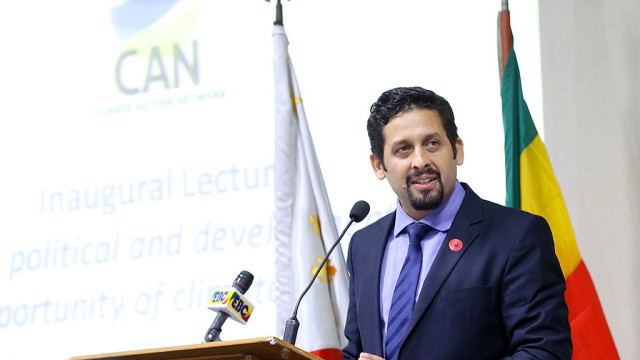
Wael Hmaidan speaking in the senate of the Philippines about one of his pet initiatives, the Climate Vulnerable Forum (Photo: CVF)
CHN interviewed some 20 people about the circumstances leading to Hmaidan’s sacking. They include people familiar with his early career in Lebanon, Can-I staff and board members – past and present – and members of the wider network. The majority spoke on condition of anonymity, citing fear of retaliation or confidentiality concerns.
This article also draws on written evidence: principally the final draft report by Insource Services, the consultancy appointed by the Can-I board of directors to investigate. This was shared with Climate Home News by an anonymous source.
The Can-I board had the power and responsibility to hold him to account. When it announced its decision to terminate Hmaidan’s contract earlier this year, it apologised that “appropriate mechanisms and actions to address inappropriate behaviour had not sufficiently been put in place”.
The complaints
Can-International is one of the most vocal presences in a crowded field of organisations trying to influence climate policy. It marks out those countries and corporations who pollute for public opprobrium, handing out ‘fossil of the day’ awards at UN climate talks. This moral clarity is part of what attracts campaigners like Borday.
Borday’s time at Can-I was brief but it had a lasting impact on her mental health, according to her friends, father and colleagues. She joined in November 2015, on the eve of Cop21 in Paris, the UN summit where governments would strike a historic climate pact. She left after a series of strategy meetings in Berlin, February 2016.
Borday “had a deep, strong belief about how the world should be”, her father Robert wrote in an open letter addressed to the climate movement on the anniversary of her death. But while working at Can-I, he said his daughter had become “increasingly panicked” as she struggled under a heavy workload with little support or guidance. That was corroborated by her colleagues, who recalled an instance of Hmaidan publicly berating a visibly distressed and exhausted Borday.
Her father said Borday, who was 30 when she died, had faced “challenges” with her mental health prior to working for Can-I, but these had been under control. After leaving Can-I, she spiralled into depression. Her experience in the climate movement “was so negative and humiliating that it ruined her chance of recovery,” in his view.
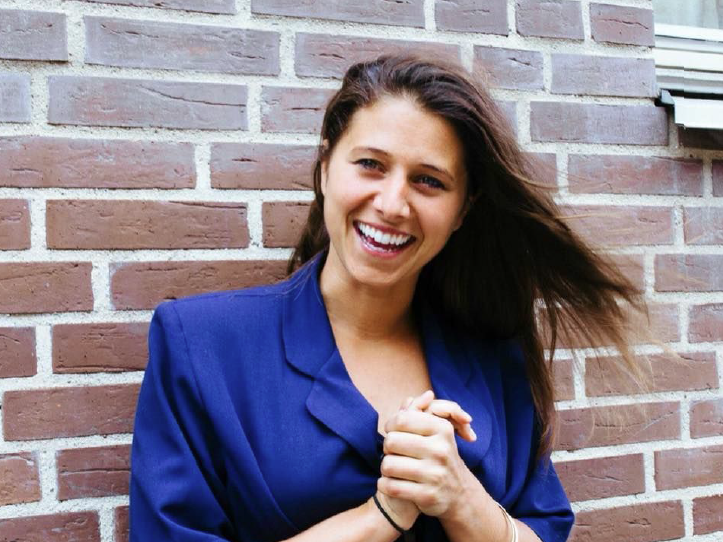
Holly Borday "had a deep, strong belief about how the world should be" (Photo: Supplied)
Borday used his letter to encourage those with similar stories to come forward. They did. His letter, sent in November 2018, was followed in the same week by three others: two from individual former employees and one signed by 15 current and former staff. Can-I suspended Hmaidan and initiated the independent probe. Two further complaints were submitted after the investigation began and more than 40 people got in touch to give evidence.
In her report, US-based investigator Saleha Walsh expressed surprise both at the number of people who came forward and the fear of retaliation they showed. “People were concerned about the effect that speaking out against Mr Hmaidan could have on their career or job at the secretariat and, most strikingly, in the climate movement in general,” the report said. Several interviewees cried as they recalled events that were traumatic for them.
From interviews, photos and screenshots, investigators compiled nearly 100 alleged occurrences of bullying, harassment and behaviour “unbecoming” of an organisational leader.
“He didn’t really want to get it.”
Hmaidan was interviewed as part of the investigation. To protect the privacy of respondents, he was only asked to respond to incidents with multiple witnesses, or that followed a pattern. He denied most of the specific incidents put to him. During the conversation, he said: “Do I say stupid things, yes… Have I done inappropriate things, yes.”
Hmaidan did not respond to multiple invitations to comment for this article.
Five respondents came to Hmaidan’s defence. Their character references were outweighed by a “preponderance of evidence” to support the allegations, the investigator wrote.
Hmaidan was described by witnesses as a “predator” who bypassed usual hiring practices to surround himself with attractive women. He told investigators they had been referred to by others as his “harem”. These were qualified professionals who were excited and proud to work for the climate cause. He objectified, belittled and undermined them. Sample comments, which he denied making, include “you’re here to look good” and “you’re smart for a blonde”. One complainant accused him of inappropriately touching her and making repeated sexual overtures.
Working for Hmaidan was miserable, according to the testimony of his former employees. He was demanding and unrealistic, with an explosive response to disappointment. Several staff said they were chronically underpaid.
Multiple employees told the investigator Hmaidan’s bullying pushed them to the verge of “breakdown” – or over the edge. One individual’s doctor attributed her health problems to “trauma” at work.
Some complained to Hmaidan about these conditions. He dismissed their concerns as trivial, they said, compared to the network’s mission to “save the world” and warned them not to make trouble.
A history of bullying
Hmaidan’s bunker mentality pushed individuals’ comfort and safety to the back seat. In his first public statement as executive director of Can-I in April 2012, he drew a parallel between fighting climate change and his formative years living through Lebanon’s civil war. “Eventually, my generation did not really care who was right and who was wrong, and we currently blame all of those involved in the war for ruining our childhood,” he wrote.
Before joining Can-I, Hmaidan co-founded IndyAct, which is rare among Middle Eastern NGOs for raising awareness of climate change. Soon after his suspension from Can-I, the IndyAct website was taken offline, along with his social media profiles.
A woman who previously worked for IndyAct told CHN: “Wael has a reputation in Lebanon of being a bully… You are always not enough when you work with him, you are incompetent, you are always expected to work extremely long hours.”
“Wael was just such a revered figure in the movement”
Another, who joined IndyAct straight from university, had a familiar account: low pay, excessive and last-minute demands, criticism over trivial details. “You would be so exhausted and stressed and it was all so unnecessary.” At the time, she internalised the blame. “It was only later that I started to realise it was exceptionally bad.”
One of Hmaidan’s defenders, a friend and colleague from Lebanon, attributed the complaints against him to racial bias. Arab men are few and far between in the international climate movement.
Another former Can-I employee suggested Hmaidan was a victim of culture clash; coming from the global south, she had seen similar behaviour from other men and was untroubled by it.
Other Lebanese sources rejected this. “It is not normal behaviour at all,” one said.
Once he took over at Can-I, Hmaidan fostered a “work hard, party hard” ethos. The international nature of the work meant staff and members of the network would often stay in hotels together, at conferences or retreats. There would be boozy dinners and sometimes dancing in the evenings.
It was widely known that Hmaidan pursued women in this sphere. “His behaviour is the worst kept secret in the world, that he has relationships with junior staff,” one executive of an NGO told the investigator. He would talk about women he wanted to sleep with and his “open marriage”.
Hmaidan told the investigator Walsh he could not recall describing his marriage as “open”, only that he was separated from his wife for a year. He admitted to sometimes inviting women back to his room. If they declined, he said, “that was it”.
However his professional standing made it more complicated than that. Women who turned down his advances reported to Walsh that he then excluded them from meetings, seemingly in retaliation. Others said he leered at them or made disrespectful comments, but they were afraid to complain because of the sway he had over their careers.
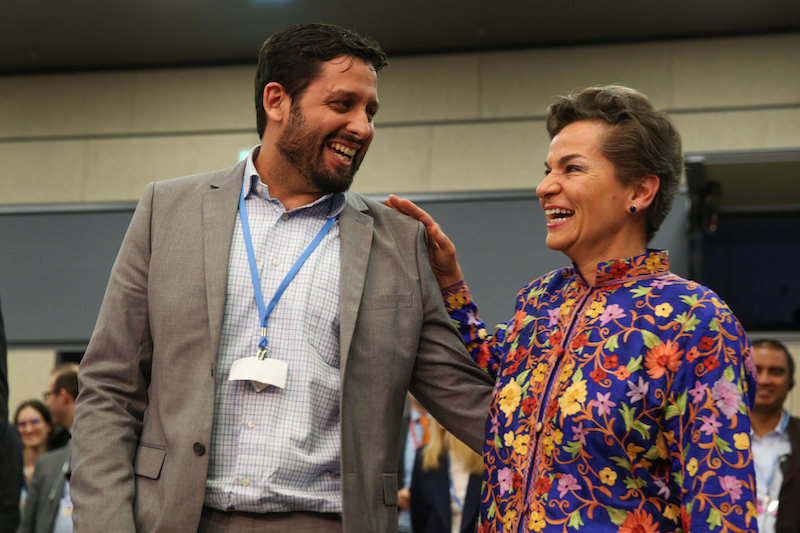
Hmaidan and then-UN climate chief Christiana Figueres in 2016 (Photo: IISD/ENB/Kiara Worth)
“Wael was just such a revered figure in the movement, he is just somebody you immediately feel like you want to have in your camp and you want to be on good terms with. Can, for all of its faults, is hugely important and influential, in a positive way,” one young woman who had professional dealings with Hmaidan told CHN. “He was with me always very flirty and very touchy in ways you shouldn’t be with junior members of the network. I thought he was a big creep but don’t think I realised the full extent.”
Another woman told CHN how a professional conversation pivoted to a sexual proposition. Hmaidan approached her at Rio +20 in 2012. It was her first big international conference. He was a respected climate leader and she saw it as a networking opportunity. They joined some others for dinner and while sharing a taxi, he moved to kiss her. She was surprised but “rolled with it” and they had sex. It was a consensual encounter but the way he obtained that consent – feigning professional interest – would later strike her as deceitful. She was unaware at the time that he had a wife and children.
The following year, when they were both going to meetings in New York, she accepted an offer of accommodation with his delegation. When she arrived, she was shocked to find the accommodation on offer was Hmaidan’s bed. She told him she was not interested and hastily made alternative arrangements. “I was taken aback by his expectation that I would be into that, without even prior discussion,” she said. “I never felt endangered by him, but I felt manipulated and not well respected.” Later she unsuccessfully applied for a job at Can-I. She was left wondering if this history had been a factor.
Warnings ignored
It’s clear that Borday also felt a line had been crossed. While working at Can-I, she shared concerns with her parents about a senior male colleague who had made “inappropriate advances,” in her father’s words.
Then in early October, news of allegations of sexual harassment against film producer Harvey Weinstein prompted the sharing of stories under the hashtag #MeToo. In a Facebook post with the tag, dated 18 October 2017, Borday described a series of upsetting experiences, including with “one of my last bosses… Head of a major organization who sexually propositioned me on more than one occasion before I left dizzily confused about expectations of professional work places.”
“There is something heroic about the climate sector. People feel like they are burning for the cause and everything else is insignificant.”
Borday was writing for an audience of friends, not submitting an official complaint. She did not name Hmaidan. Still, there was no question who she meant, according to several former colleagues.
Borday died a few days later, just before the 2017 annual UN climate summit in Bonn, Germany. The news rapidly filtered back to the Can-I staff and board. It was raised at the organisation’s annual general assembly, on the sidelines of the conference.
Can-I deputy director Sarah Strack, a close confidante of Hmaidan’s, was shown Borday’s Facebook post. It is not clear whether she passed it on to members of the board.
In response to questions from CHN, the Can-I board, whose membership has now changed, said it was reviewing how the information had been shared in the organisation. Strack did not respond to a request to comment.
One former staff member raised Borday’s post with Hmaidan at the time. “He was starting to understand the way his behaviour could be perceived,” they told CHN. “But he was still a long way from really getting it. He didn’t really want to get it.”
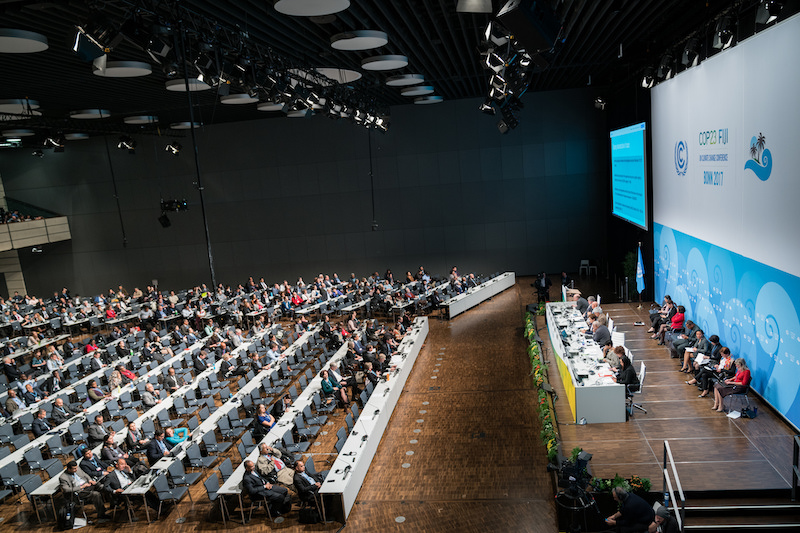
The 2017 UN climate conference in Bonn, Germany began days after Holly Borday died (Photo: UNFCCC)
The board’s inaction had echoes of its response to an official complaint in 2016. In a 5-page letter to the board, a former employee detailed a broad spectrum of concerns about the workplace culture, including Hmaidan’s sexism and unfair pay, and described the demoralising effect it had on enthusiastic recruits. Eight out of 20 staff (40%) had left within six months, by this account – all women.
CHN asked a governance expert, Jenifer Gager Holland of Board Source, how a board should handle complaints like this. They should gather information about the claims “in ways that can be trusted and in ways that demonstrate a commitment to an independent investigation,” she said. “That would include being clear about what an investigation should look like, being clear about the scope and scale of the investigation and being clear about the outcome of the investigation.”
If you would like to contact Climate Home News securely, we recommend setting up a free, encrypted ProtonMail account here and emailing [email protected].
That did not happen. A month later, in a three-paragraph response, they said they would continue to implement existing policies. “We do regret any inconvenience you might have been caused,” wrote the co-chairs, as though excusing a train delay.
Under the surface, there was some activity. The board engaged a consultant to update HR and gender policies, and review the pay scale. It adopted the complainant’s recommendation to hold confidential exit interviews between departing staff and Can board members.
These interventions tiptoed around the man at the centre of the problems. Hmaidan dismissed the complainant as an underperformer with a grudge, according to multiple sources. Despite quietly adopting some of the letter’s suggestions, the board appeared to accept his explanation.
‘His fiefdom’
Several sources CHN spoke to perceived the board as too cosy with Hmaidan. Members are carefully selected from the network each year to give a balance of regional, ethnic and gender representation – but they have much in common. They are all climate campaigners, with a limited range of expertise in governance matters and an interest in being friendly with the executive director.
“It reminds me of the freemasons,” one former staffer told CHN. “These are people who had an interdependent relationship with Wael when it came to allocation of funding.”
While some board members are from big NGOs with clout, others are freelance consultants, always on the lookout for the next grant. The Can-I secretariat spends around $1.5 million a year, mostly on salaries and travel, with some budget for sub-grants to member NGOs. Its annual report does not itemise those transfers, so it is hard to say whether they favour board members or not – but the lack of transparency raises questions.
On a much bigger scale than the direct grants, and harder to pin down, are the funding flows facilitated by Can-I. The executive director has close ties with big donors and can act as matchmaker with recipients.
The investigation report from InSource recommended introducing a conflict of interest policy for the board. “Many feel those receiving funding from Can shouldn’t also be overseeing the operation of Can,” it said.
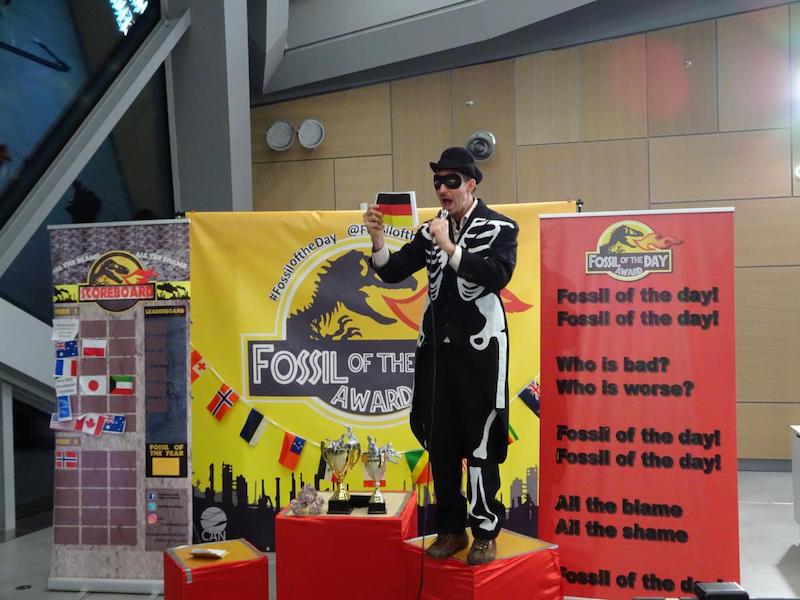
Can-International presents the Fossil of the Day award at the end of each day of UN climate talks in order to shame the country most blocking progress (Photo: Clean Energy Wire)
Another proposal was to engage outside experts to review the harassment and bullying policies, draw up a code of conduct and act as contact point for staff.
There should also be clearer lines of authority within the secretariat, the investigator advised. “The current senior management team seems to have little active involvement in some of the most distressing organisational issues,” they wrote. A former staffer put it more bluntly, saying of Hmaidan: “It felt like he was running his fiefdom, that he alone was responsible and was almighty and no questions could be raised to challenge certain affairs or the way things were operated.”
The board initially showed limited appetite for self-interrogation. Its instructions to the investigator focused on the complaints against Hmaidan. Walsh reported “systemic issues” at Can-I that were “as troubling and damaging to the organization” as the behaviour of its leader. But the reasons behind those failings, including the weak responses to the 2016 complaint and news of Borday’s death, went unexamined.
That is not to say the board was unaware of its past lapses. After the investigation concluded, it wrote to participants: “The board deeply regrets not undertaking more detailed investigations and more determined corrective action in response to earlier warning signs.”
In a further statement to CHN, the Can-I board said it was “undertaking a review in conjunction with previous board members and will use this review to learn from past incidents and responses by previous boards”.
We need your help… Climate Home News is an independent news outlet dedicated to the most important global stories. If you can spare even a few dollars each month, it would make a huge difference to us. Our Patreon account is a safe and easy way to support our work.
In February, the board appointed Tasneem Essop, an experienced South African campaigner, as interim director while it recruits a permanent replacement. Part of her job is to put the report recommendations into practice.
“We are improving board governance,” a spokesperson told CHN. “Several” committees had been established and were “meeting regularly and addressing concerns raised by the independent investigation, and are working on terms of reference for different board functions”. The board has taken initial steps to develop a conflict of interest policy, they added, which will be published when approved.
Regarding the specific recommendation to employ an external HR point of contact, the board said it could not respond “at this time”.
Hmaidan has yet to make any public statement on the outcome of the investigation. He indicated to CHN on 9 November 2018 that he wished to comment, but was prohibited by the board while the investigation was ongoing. The same day, his lawyers sent a cease-and-desist letter, threatening to sue if CHN published the allegations against him.
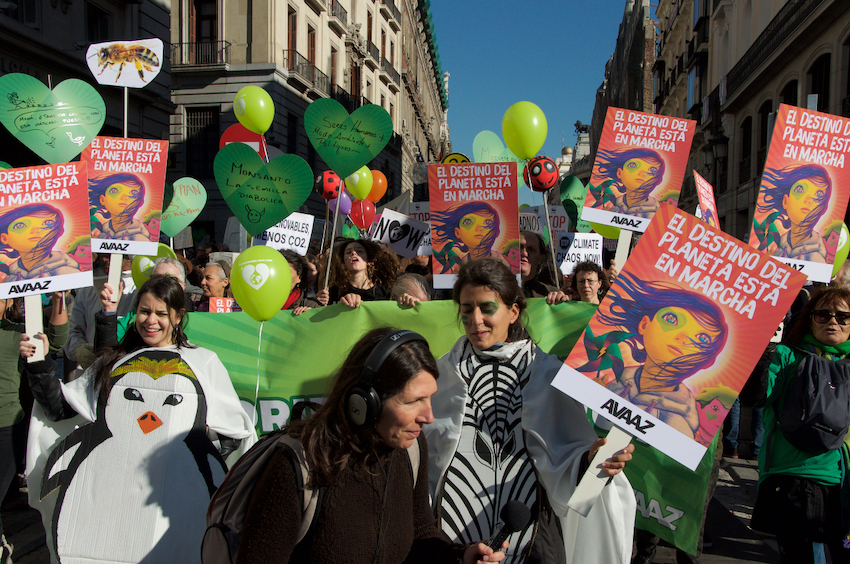
Young women form a major part of the workforce of the global climate movement, they are also central to its imagery (Photo: OsvaldoGago/Commons)
On conclusion of the investigation, the Can-I board offered to circulate a statement from Hmaidan, acknowledging the impact of his actions. The investigator had suggested this exit strategy “for the sake of the victims and equally to give him the possibility of continuing his work in another capacity within the movement”. He did not take up the offer.
If there is one word his friends and detractors alike use to describe Hmaidan, it is “ambitious”. Few would bet against a comeback, whether in the climate movement or Lebanese politics. He is seen as well-connected in Lebanon and his firing was not reported in national media, although CHN’s coverage was shared on social sites.
The person who leaked the draft investigation report to CHN stressed that the movement had to be bigger than Hmaidan’s personality. “I’m sharing this because I don’t believe we’ve got enough power and courage to remove him from the movement completely (what he clearly deserves), so additional public attention is needed,” they wrote.
Whatever Hmaidan’s strengths as a campaigner, the toll of his behaviour on staff eventually proved too high for Can-I. It took a suicide and four complaint letters to finally spur the board into action.
When Robert Borday wrote to the climate movement in November, he urged women to speak up – and people in power to listen – in his daughter’s memory.
“You are not machines who have to put up with any treatment as you fight to protect the planet. You are people and you have immense value,” he told them. “What hope do we have of saving the world if we destroy the young women who are such an important part of the future?”
International suicide helplines can be found at www.befrienders.org